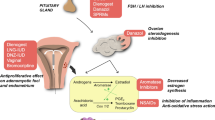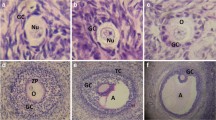Opinion statement
Most endometrial cancers are estrogen receptor and progesterone receptor positive. Hormonal therapy in endometrial cancer is best used in patients with low-grade disease and hormone receptor positivity. Though not standard of care, hormonal treatment can be considered in endometrial cancer treatment in both the early-stage upfront setting for patients who are not surgical candidates and in advanced and recurrent endometrial cancer. In patients who desire fertility preservation or who are not surgical candidates, levonorgestrel intrauterine device and oral progesterone are preferred treatment options. In patients with advanced and metastatic disease, there is no standard-of-care second-line treatment, and hormonal treatment is a widely accepted option for low-grade disease. Beyond progesterone, selective estrogen receptor modulators, aromatase inhibitors, gonadotropin-releasing hormone agonists, and fulvestrant are hormonal treatment options. New therapies, such as MTOR inhibitors and CDK 4/6 inhibitors, have been extensively studied in breast cancer and are shown to be useful in conjunction with hormonal therapies particularly when there is suspected resistance to anti-estrogen treatment. Hormonal therapies also tend to be better tolerated than chemotherapy agents, making them a desirable option particularly in patients with lower performance status. Results from ongoing clinical trials will hopefully help shed light on the use of combination treatment in patients with hormone receptor–positive, low-grade metastatic, and recurrent endometrial cancer.

Similar content being viewed by others
References and Recommended Reading
Papers of particular interest, published recently, have been highlighted as: • Of importance •• Of major importance
SEER. Cancer Stat Facts: Uterine Cancer: SEER. 2022.
MacMahon B. Risk factors for endometrial cancer. Gynecol Oncol. 1974;2(2):122–9.
Smith D, Stewart CJR, Clarke EM, Lose F, Davies C, Armes J, et al. ER and PR expression and survival after endometrial cancer. Gynecol Oncol. 2018;148(2):258–66.
Backes FJ, Walker CJ, Goodfellow PJ, Hade EM, Agarwal G, Mutch D, et al. Estrogen receptor-alpha as a predictive biomarker in endometrioid endometrial cancer. Gynecol Oncol. 2016;141(2):312–7.
Rodriguez AC, Blanchard Z, Maurer KA, Gertz J. Estrogen signaling in endometrial cancer: a key oncogenic pathway with several open questions. Horm Cancer. 2019;10(2-3):51–63.
Onstad MA, Schmandt RE, Lu KH. Addressing the role of obesity in endometrial cancer risk, prevention, and treatment. J Clin Oncol. 2016;34(35):4225–30.
Gompel A. Progesterone and endometrial cancer. Best Pract Res Clin Obstet Gynaecol. 2020;69:95–107.
Levine DA, Getz G, Gabriel SB, Cibulskis K, Lander E, Sivachenko A, et al. Integrated genomic characterization of endometrial carcinoma. Nature. 2013;497(7447):67–73.
Shen F, Gao Y, Ding J, Chen Q. Is the positivity of estrogen receptor or progesterone receptor different between type 1 and type 2 endometrial cancer? Oncotarget. 2017;8(1):506–11.
Bruchim I, Sarfstein R, Werner H. The IGF hormonal network in endometrial cancer: functions, regulation, and targeting approaches. Front Endocrinol (Lausanne). 2014;5:76.
Tashiro H, Blazes MS, Wu R, Cho KR, Bose S, Wang SI, et al. Mutations in PTEN are frequent in endometrial carcinoma but rare in other common gynecological malignancies. Cancer Res. 1997;57(18):3935–40.
Lee YR, Park J, Yu HN, Kim JS, Youn HJ, Jung SH. Up-regulation of PI3K/Akt signaling by 17beta-estradiol through activation of estrogen receptor-alpha, but not estrogen receptor-beta, and stimulates cell growth in breast cancer cells. Biochem Biophys Res Commun. 2005;336(4):1221–6.
Porta C, Paglino C, Mosca A. Targeting PI3K/Akt/mTOR signaling in cancer. Front Oncol. 2014:4.
Caduff RF, Johnston CM, Frank TS. Mutations of the Ki-ras oncogene in carcinoma of the endometrium. Am J Pathol. 1995;146(1):182–8.
Westin SN, Sill MW, Coleman RL, Waggoner S, Moore KN, Mathews CA, et al. Safety lead-in of the MEK inhibitor trametinib in combination with GSK2141795, an AKT inhibitor, in patients with recurrent endometrial cancer: an NRG Oncology/GOG study. Gynecol Oncol. 2019;155(3):420–8.
MacKay HJ, Freixinos VR, Fleming GF. Therapeutic targets and opportunities in endometrial cancer: update on endocrine therapy and nonimmunotherapy targeted options. Am Soc Clin Oncol Educ Book. 2020;40:1–11.
Tanaka T, Terai Y, Ashihara K, Fujiwara S, Tanaka Y, Sasaki H, et al. The efficacy of the cyclin-dependent kinase 4/6 inhibitor in endometrial cancer. PLoS One. 2017;12(5):e0177019.
Talhouk A, McConechy MK, Leung S, Yang W, Lum A, Senz J, et al. Confirmation of ProMisE: a simple, genomics-based clinical classifier for endometrial cancer. Cancer. 2017;123(5):802–13.
National Comprehensive Cancer Network. NCCN guidelines: uterine neoplasms. 2022.
Altman AD, Thompson J, Nelson G, Chu P, Nation J, Ghatage P. Use of aromatase inhibitors as first- and second-line medical therapy in patients with endometrial adenocarcinoma: a retrospective study. J Obstet Gynaecol Can. 2012;34(7):664–72.
Barker LC, Brand IR, Crawford SM. Sustained effect of the aromatase inhibitors anastrozole and letrozole on endometrial thickness in patients with endometrial hyperplasia and endometrial carcinoma. Curr Med Res Opin. 2009;25(5):1105–9.
Chae-Kim J, Garg G, Gavrilova-Jordan L, Blake LE, Kim TT, Wu Q, et al. Outcomes of women treated with progestin and metformin for atypical endometrial hyperplasia and early endometrial cancer: a systematic review and meta-analysis. Int J Gynecol Cancer. 2021;31(12):1499–505.
Janda M, Robledo KP, Gebski V, Armes JE, Alizart M, Cummings M, et al. Complete pathological response following levonorgestrel intrauterine device in clinically stage 1 endometrial adenocarcinoma: results of a randomized clinical trial. Gynecol Oncol. 2021;161(1):143–51.
Westin SN, Fellman B, Sun CC, Broaddus RR, Woodall ML, Pal N, et al. Prospective phase II trial of levonorgestrel intrauterine device: nonsurgical approach for complex atypical hyperplasia and early-stage endometrial cancer. Am J Obstet Gynecol. 2021;224(2):191.e1–e15 This is the first clinical trial that also looked at molecular aspects of biopsies to assess response.
Westin SN. Levonorgestrel-Releasing Intrauterine System With or Without Everolimus in Treating Patients With Atypical Hyperplasia or Stage IA Grade 1 Endometrial Cancer (LEVER) [ClinicalTrials.gov Identifier: NCT02397083].
Yang BY, Gulinazi Y, Du Y, Ning CC, Cheng YL, Shan WW, et al. Metformin plus megestrol acetate compared with megestrol acetate alone as fertility-sparing treatment in patients with atypical endometrial hyperplasia and well-differentiated endometrial cancer: a randomised controlled trial. Bjog. 2020;127(7):848–57 This trial demonstrated higher complete response rates in patients who took metformin along with megestrol.
Soliman PT, Westin SN, Iglesias DA, Fellman BM, Yuan Y, Zhang Q, et al. Everolimus, letrozole, and metformin in women with advanced or recurrent endometrioid endometrial cancer: a multi-center, single arm, phase II study. Clin Cancer Res. 2020;26(3):581–7 This is the first trial looking at combined treatment with an MTOR inhibitor and hormonal treatment in endometrial cancer.
Ethier JL, Desautels DN, Amir E, MacKay H. Is hormonal therapy effective in advanced endometrial cancer? A systematic review and meta-analysis. Gynecol Oncol. 2017;147(1):158–66.
Fiorica JV, Brunetto VL, Hanjani P, Lentz SS, Mannel R, Andersen W. Phase II trial of alternating courses of megestrol acetate and tamoxifen in advanced endometrial carcinoma: a Gynecologic Oncology Group study. Gynecol Oncol. 2004;92(1):10–4.
Kullander S. Treatment of endometrial cancer with GnRH analogs. Recent Results Cancer Res. 1992;124:69–73.
Emons G, Gründker C. The role of gonadotropin-releasing hormone (GnRH) in endometrial cancer. Cells. 2021;10(2).
Miller DS, Scambia G, Bondarenko I, Westermann AM, Oaknin A, Oza AM, et al. ZoptEC: phase III randomized controlled study comparing zoptarelin with doxorubicin as second line therapy for locally advanced, recurrent, or metastatic endometrial cancer (NCT01767155). J Clin Oncol. 2018;36(15_suppl):5503.
Carlson RW. The history and mechanism of action of fulvestrant. Clin Breast Cancer. 2005;6(Suppl 1):S5–8.
Covens AL, Filiaci V, Gersell D, Lutman CV, Bonebrake A, Lee YC. Phase II study of fulvestrant in recurrent/metastatic endometrial carcinoma: a Gynecologic Oncology Group study. Gynecol Oncol. 2011;120(2):185–8.
van Weelden WJ, Massuger L, Pijnenborg JMA, Romano A. Anti-estrogen treatment in endometrial cancer: a systematic review. Front Oncol. 2019;9:359.
Bogliolo S, Gardella B, Dominoni M, Musacchi V, Cassani C, Zanellini F, et al. Effectiveness of aromatase inhibitors in the treatment of advanced endometrial adenocarcinoma. Arch Gynecol Obstet. 2016;293(4):701–8.
Rani A, Stebbing J, Giamas G, Murphy J. Endocrine resistance in hormone receptor positive breast cancer–from mechanism to therapy. Front Endocrinol. 2019;10.
Arpino G, Weiss H, Lee AV, Schiff R, De Placido S, Osborne CK, et al. Estrogen receptor-positive, progesterone receptor-negative breast cancer: association with growth factor receptor expression and tamoxifen resistance. J Natl Cancer Inst. 2005;97(17):1254–61.
Gaillard SL, Andreano KJ, Gay LM, Steiner M, Jorgensen MS, Davidson BA, Havrilesky LJ, Alvarez Secord A, Valea FA, Colon-Otero G, Zajchowski DA, Chang CY, McDonnell DP, Berchuck A, Elvin JA. Constitutively active ESR1 mutations in gynecologic malignancies and clinical response to estrogen-receptor directed therapies. Gynecol Oncol. 2019;154(1):199–206. https://doi.org/10.1016/j.ygyno.2019.04.010.
Shah M, Nunes MR, Stearns V. CDK4/6 inhibitors: game changers in the management of hormone receptor–positive advanced breast cancer? Oncol (Williston Park). 2018;32(5):216–22.
Colon-Otero G, Zanfagnin V, Hou X, Foster NR, Asmus EJ, Wahner Hendrickson A, et al. Phase II trial of ribociclib and letrozole in patients with relapsed oestrogen receptor-positive ovarian or endometrial cancers. ESMO Open. 2020;5(5):e000926 This is the first clinical trial establishing the efficacy of CDK 4/6 inhibitors with hormonal treatment in endometrial cancer.
Slomovitz BM, Jiang Y, Yates MS, Soliman PT, Johnston T, Nowakowski M, et al. Phase II study of everolimus and letrozole in patients with recurrent endometrial carcinoma. J Clin Oncol. 2015;33(8):930–6.
Konstantinopoulos PA LE, Xiong N, et al. Abemaciclib/letrozole combo shows promise in recurrent ER+ endometrial cancer. 2022 SGO Annual Meeting on Women’s Cancer 2022.
Fleming GF, Filiaci VL, Marzullo B, Zaino RJ, Davidson SA, Pearl M, et al. Temsirolimus with or without megestrol acetate and tamoxifen for endometrial cancer: a gynecologic oncology group study. Gynecol Oncol. 2014;132(3):585–92.
Heudel P, Frenel JS, Dalban C, Bazan F, Joly F, Arnaud A, et al. Safety and Efficacy of the mTOR inhibitor, vistusertib, combined with anastrozole in patients with hormone receptor-positive recurrent or metastatic endometrial cancer: the VICTORIA multicenter, open-label, phase 1/2 randomized clinical trial. JAMA Oncol. 2022;8(7):1001–9.
Soliman PT. A phase II, two-arm study of everolimus and letrozole, +/- ribociclib (Lee011) in patients with advanced or recurrent endometrial carcinoma: ClinicalTrials.gov; [Available from: https://clinicaltrials.gov/ct2/show/NCT03008408.
Pa K. Abemaciclib with letrozole in recurrent or persistent endometrial cancer: ClinicalTrials.gov; [Available from: https://clinicaltrials.gov/ct2/show/NCT03675893.
Green A. Evaluating cancer response to treatment with abemaciclib and fulvestrant in women with recurrent endometrial cancer: ClinicalTrials.gov; [Available from: https://clinicaltrials.gov/ct2/show/NCT03643510.
Author information
Authors and Affiliations
Corresponding author
Ethics declarations
Conflict of Interest
The authors do not have any potential conflicts of interest to disclose.
Human and Animal Rights and Informed Consent
This article does not contain any studies with human or animal subjects performed by any of the authors.
Additional information
Publisher’s note
Springer Nature remains neutral with regard to jurisdictional claims in published maps and institutional affiliations.
This Article is part of the Topical Collection on Gynecologic Cancers
Rights and permissions
Springer Nature or its licensor (e.g. a society or other partner) holds exclusive rights to this article under a publishing agreement with the author(s) or other rightsholder(s); author self-archiving of the accepted manuscript version of this article is solely governed by the terms of such publishing agreement and applicable law.
About this article
Cite this article
Kailasam, A., Langstraat, C. Contemporary Use of Hormonal Therapy in Endometrial Cancer: a Literature Review. Curr. Treat. Options in Oncol. 23, 1818–1828 (2022). https://doi.org/10.1007/s11864-022-01031-6
Accepted:
Published:
Issue Date:
DOI: https://doi.org/10.1007/s11864-022-01031-6




